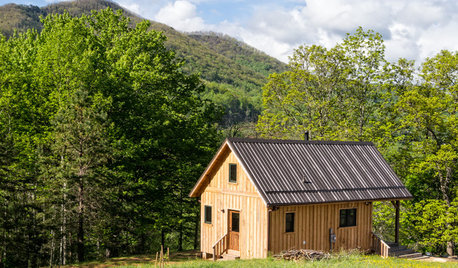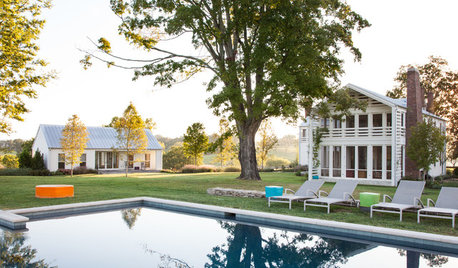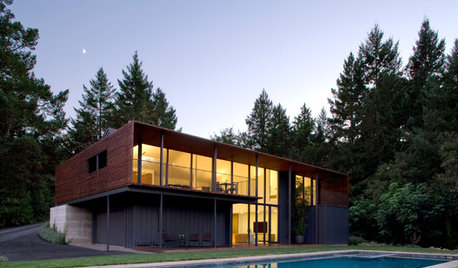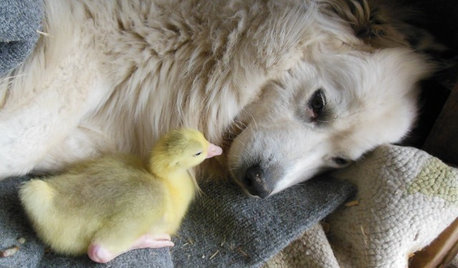how many acres..to be a farm?
Once upon a time I read some posts about us/me small acre farms with 10 acres or less that we were not true working farms. The BIG farmers said we had no place posting on this forum. I have been reading anyway do you think things have changed? This was back in 1999. So how do big farmers feel about us little guys now?
I feel I have learned much from those that shared. It's not easy to raise your own animals without help! You can read every book in the world, but talking to a real person is worth a millon bucks!Thanks to those who shared!
Comments (29)
robin_maine
16 years agolast modified: 9 years agoI own 45 acres. I farm two. One acre is organic vegetables from mid winter to late December. I net enough to pay all of the bills and live very comfortably. In this case size doesn't matter. If you're successful at what you do what someone else thinks doesn't matter.
Related Professionals
Milwaukee Landscape Architects & Landscape Designers · Mahwah Landscape Contractors · Severna Park Landscape Contractors · Antioch Landscape Contractors · Oxon Hill Landscape Contractors · Alsip Fence Contractors · Hackensack Fence Contractors · Torrance Fence Contractors · Kingsburg Fence Contractors · Shorewood Decks, Patios & Outdoor Enclosures · Chicago Decks, Patios & Outdoor Enclosures · Grafton Decks, Patios & Outdoor Enclosures · Midwest City Decks, Patios & Outdoor Enclosures · New Albany Decks, Patios & Outdoor Enclosures · Santa Ana Decks, Patios & Outdoor Enclosureskydaylilylady
16 years agolast modified: 9 years agoI think the acreage to be a farm depends upon what you are doing. I suppose I think of a few goats, a couple horses, a bunch of chickens, ducks and turkeys where nothing is sold as brood stock or sent to market, and everything is a pet, as a hobby farm. If you can afford it who am I to say that's wrong? Enjoyment is obtained so why not.
What I sometimes find irritation with is smaller farmers who feel larger farmers are destroying the environment with unsafe practices and larger farmers who think smaller farmers can't know anything about farming because they don't have hundreds of acres and do everything "BIG"
There's room for everyone.
BTW, we farm rather small with a herd of about 100 brood cows with calves, half an acre of daylilies and about an acre of market produce.
Janet
dannyboquet
16 years agolast modified: 9 years agoI think too much is being made about a farm being a "true working farm." We have 6 acres, with free range chickens and guineas, peacocks, 10 Nigerian Dwarf goats in a 2 acre fenced pature with a barn, we rent 2 stalls in the barn to a man with 2 horses. We have a large cage of Love Birds and a large cage of Cockatiels. All animals are essentially pets, except we eat the eggs of the chickens and guineas. We have about 80 fruit trees and vines, nothing is sold, as we both come from large families and have many friends. We consider what we have to be a hobby farm. But you know what? We still have the same concerns as a "real" farmer, just on a much smaller scale. We want our animals to be healthy. We want our fruit trees to be healthy. I love reading about people raising a few animals in their backyard. We are not trying to be farm pretenders, we just want good advice on keeping our animals and plants healthy. We're just hoping the "real" farmers and others with knowledge will grace us with their wisdom earned over many years (and maybe, generations). I, for one, truly appreciate the time so many people spend helping those of us who really need the help.
Maggie_J
16 years agolast modified: 9 years agoA lot of people left here over this issue... I miss them and personally I would rather not stir up the controversy again.
I've never made a secret of the fact that while I have 32 acres, most of it is scrub and all I have in the way of livestock is a small flock of chickens (for eggs and occasional meat), three Pilgim geese (the beginning of a breeding program) and a small backyard rabbitry to provide meat for the table. We garden, but just for ourselves. I don't consider this a "hobby" -- it is a lifestyle. Nor are our critters (except our cat) pets. (And even our darling Marilla was adopted because of rodent problems.) The geese are "almost" pets in the sense that they are very personable, intelligent and interactive and we hope they will be with us for their lifetime... but they are here to make more geese, not just for entertainment and to love. What we do here comes closer to homesteading, I suppose, but that forum moves so slowly that it does not meet my needs.
I've never felt uncomfortble here or unwelcome. I post when I have a problem (not very often anymore) or to answer questions that I feel qualified to deal with... and I am posting regularly now about my natural feeding program for rabbits, because the interest seems to be there and I feel I am making a real breakthrough in small animal husbandry. I believe I make a solid contribution here... and whether I have one acre or one thousand, whether my sales are occasional or the major part of my income really has no bearing on it. We are here to learn and to help each other. Let's leave it at that.
Just my two cents (Canadian). ;)
palmfarmer
16 years agolast modified: 9 years agoI think it's all attitude, those with good attitudes and those with bad.
I used to farm in a family operation, we had 800 some odd acres, now its down to just me, and 35 acres of nursery and field grown material. and I dont feel I am any less of a farmer/nurseryman than I used to be, my bottom line is up and my expenses are down. I visit nurserys all over the the state of Tx some of the best ones were small and some of the worst were huge!! it's the people not the acreage that make a farm.beeliz
16 years agolast modified: 9 years agome,well I have 1 acre ...but I have a hobby farm. Does that count?
lfrj
16 years agolast modified: 9 years agoTry this on 'for size' (punny, eh?)
I think of it this way. Microsoft is a business. The corner stop-n-shop is a business. No one points at one or the other and discriminates for size...they're different AND similar in many, many ways...but both are generally considered businesses.
I think of farms as operations. Some are larger with greater profit, some smaller, yielding only enough profit for the farmer to appreciate, but both are operations none-the-less.
Our micro-operation of 5 acres, 2 dozen or so geese & poultry, and a dozen or so rabbits - aims toward principals of permaculture and sustainability. The yield from our pasture and gardens are returned to our animals, the yield from our animals feed the gardens and pasture. Our role is to keep it all twirling and balanced... and we skim a small measure of Âprofit off the top for our own sustenance. (That said, let me emphasize that this requires a TREMENDOUS amount of work and research, but that's the goal). To many, our 'operation' would be considered a 'homestead' - but I've always thought of a homestead as another 'type' of farm. (Could get singed for that one!).
I think of a larger farm as merely a larger operation. It has greater size, heftier yield and hopefully, lots more profit. Much of its yield is returned to the operation and some skimmed off the top for owner sustenance. It's just a lot more to twirl. Be it tree farmer, dairy farmer or homesteader, all of these 'operations' have similar practices, problems and concerns, and yet, they are obviously very different as well.
A hobby farm seems to me, to be like a non-profit (compared to a profit outfit). More outside resources are input with much of the output being is a very beneficial aesthetic. Animals may be more likely pets, gardens are fruitful activities, and the 'yield' is a rich and healthy lifestyle. It would still register as an operation, I suppose, and I should think qualifies as yet another 'type of farm'.
There are lots of shades in between.
But, in my mind - acreage has little to do with it so much as the depth of its operation.
2 cents!
LF, RJ
velvet_sparrow
16 years agolast modified: 9 years agoI get a good chuckle out of anyone who pulls the 'snob' card when it comes to outdoor work...it's all the same dirt, sweat and blood. :) When you dig a hole, you can use a shovel or a backhoe, but in the end, it's still just a hole in the ground.
Same with 'farming' or ranching, or backyard hobbyist, whatever you call it. I've lived on a small 1/2 acrea 'ranch(ette)' in an urban area with more than 32 fruit trees, a full garden, 30 chickens, two horses, rabbits, ducks, turkeys, quail, guinea pigs, a dog and a cat. It had a septic tank and horse trails in front of the house instead of sidewalks, but did have a city water supply. My sister, my brother and myself as pre-teens built the horse corral, fed and maintained the animals, hauled bales of hay and 50 pound sacks of feed, dug a new septic tank and leech line, harvested the fruit and vegetables, slaughtered and processed our own meat chickens and rabbits, incubated baby chicks, canned tons of food, etc. Our family managed to mostly sustain ourselves off of our own resources, except for milk, grain and beef. We had a lot of work crammed onto that small property and I'm glad that I learned how to do all these things.
After that, in high school, we moved to a new place that was larger, 3/4 of an acre. Had to build ANOTHER horse corral, this time in November in the Sierra mountains (can you say, 'permafrost'?) The highlight to this was having my mom boil huge kettles of water for us to pour into the postholes we were digging in order to thaw the ground enough to continue digging the hole. We broke three post drivers getting the steel fence posts into the ground. Our neighbors all cackled, "This is the coldest winter here in 20 years!" Yeah. Yay. Converting part of the barns, built in the mid-1800's to house the horses, was even more fun, as was dealing with the cougars, coyotes, rattlesnakes and curious bears that came around. But this place didn't have the fruit trees or the garden capabilities, and we had to manage our water use because we were on well water. No chickens, rabbits or ducks, either.
Now I have your basic 50 foot by 30 foot suburban southern California backyard, and my neighbors all think we're NUTS for keeping chickens. Most kids around here barely know what a dog or cat is, so our chickens are a huge draw and source of wonder, especially the multicolored eggs. I do have three fruit trees, and next Spring will install a vegetable garden, because homegrown ANYTHING tastes better and is healthier than the processed junk you find in the market. My daughter helps me make jams and jellies every year, and the other day told me she wants to make pickles. :)
People that work true farms--the ones that totally sustain themselves and maybe have extra to sell, with growing their own feed and grain, with cows for milk and meat, chickens for meat and eggs, have my undying awe (and envy). I'd love to do something like that, if I had the money to invest in it and the full health to do it.
But I think lots of people on this forum have something in their lives which prevents them from becoming a full-on 'farmer'. For me, it's my various disabilities from injuries I sustained years ago from falling down a flight of stairs when I was 8 months pregnant. For others, it may be money, or being tied to a job that they can't afford to quit. Taking care of elderly parents or handicapped children. Could be anything, and no one should judge them as below them for not being Superfarmer, Amazing Producer Of Mega-Quantities Of Food For The World.
As people mature, there are going to be people who desire to work with the land but have no earthly idea how and where to start--that's where this forum is so incredibly valuable. Farming is a wonderful, fulfilling, amazing lifestyle that I think everyone should experience at least once. It is hugely empowering. Heck, my parents took us from a totally suburban southern California tract home to that 1/2 acre ranchette, and it was the best thing that ever happened to me. My daughter is growing up surrounded by a flock of chickens, and seeing their cycle of hatching, growing, mating, egg laying and death--that full circle of life--is going to be a benefit to her in her experience with life. Not to mention easing her into that whole 'facts of life/birds and the bees' talk in a few years. :)
OP, you are right--books are great, but nothing beats first-hand experience, if nothing else than for all of those weird, unexpected little things that crop up. I've never felt unwelcome here, either, but I know that some people have left this forum because they felt it didn't quite fit with their 'large scale' operations. Hopefully they still pop in and read up occasionally, and will continue to give us all the benefit of their wisdom and experience. :)
Yikes, I've typed way more than I meant to. Sorry. :)
Velvet ~:>
earthnut
16 years agolast modified: 9 years agoThank you, Velvet, I totally agree with you. I'm an urbanite with 5000 sqft of land in the middle of a city, yet I grow fruit, veggies, and am planning to get chickens and a goat. I know a lady with even less land who has a beehive, 2 alpacas, a bunch of angora rabbits, and a vegetable garden! She sells the knitted items made from her own animals and dye plants, and also sells the honey from her little property. I wouldn't consider either of us "farms" but we can be productive too, in our small way.
Here's a question: can a farm (any size) be called a farm if it supports the farmers with food and basic necessities but doesn't turn a profit? Is this not what most farms in the world are like & have been? Small farms with subsistence farming? I personally don't think farms have to be businesses, nor be the major source of income for the family.
lfrj
16 years agolast modified: 9 years agoHi Earthnut, in my mind, (again), "farm" AND "profit" can mean many things. Hope I made myself clear earlier. Sure didn't mean to come off as arrogant by any means.
I recently read an interesting article about a fellow 'farmer' limited to garage and his 800 sq ft back yard! You can find it by googling "New Yorker pushes limits of the "locavore" life". A brave and fascinating endeavor. Enjoy!
Velvet - fascinating story, thanks for sharing.
LF & RJ
beeliz
16 years agolast modified: 9 years agoVelvet,I like your style!! :)
Like I said earlier in the post,my land is barely 1 acre..but I have hens and a rooster,rabbits,ducks, and 2 goats with a pond, all living happily together. We used to have a potbelly pig but lives next door now.. I do sell duck and hen eggs and it actually pays for their feed! I just adore having animals..I don't do it for a profit(I'm a hairdressr!) but to keep them happy and give them an awsome life. and they need not worry about getting eaten either because we're vegetarians! haha! but I am what you would call a hobby farm.roxann3576
16 years agolast modified: 9 years agoCall it what you want.
I don't think anyone creating a lifestyle of 'farming' ideas has any right to label someone a hobbyist versus a farmer. Yes, the ideal of someone battling weather and huge tracts of land is a lot different than someone managing a family garden, but in my opinion, it's the same, finances are a lot different and possibly where the household income comes from is definitely different. Would you say that Donald Trump is a business man while the banker down the street is a 'white collar worker', don't think that fits either.
The snobbery brought from one user on this very subject, who wasn't even a regular poster, did bring heated conversation to the board and it has caused a lot of people to leave, they haven't posted anything since.
Now, having said that, there was also a troll who wanted to create arguments with a certain steady poster in almost every topic he joined in to. Since this group left, this board has become slower paced.
I may get heated comment over this, but to me, farming is a mindset. In my mind, we farm. We are not ranchers although that's really all we do with our land, we raise a very small herd of cattle, nothing special about it. I have a few chickens, so what.
Am I a farmer, yes.Miss_Kitty
16 years agolast modified: 9 years agoWe have five acres, and while my goal is the homestead ideal: produce all our own food, we are very, very far from it. My cash crop is the ducks, with chickens and eggs expected to take over in the next few years.
We call our place "Jordan's Croft" because the old Irish word for a 5 to 10 acre homestead was 'croft.' Around us are farms of hundreds of acres. I respect my farming neighbors and friends, but I can't compare what we do to what they do. They work at it 24/7, and bless them for it!
Maybe some day, I'll be able to support myself from poultry and herbs, get some fruit trees and so forth. But until then I'm happy with my aging horses and all my birds.
I miss some of the hard-core farmers who used to post here. And I always like to hear from new people. I've lurked and posted here and there since 1998, or 1999, I think. I started out in cottage garden forum, but I was already more of a farmer than a gardener.
I would not want to see more flaming controversy, but I do love a lively discussion.
Take care, all of you!
Kittyrobin_maine
16 years agolast modified: 9 years agoThis subject was brought up in a homesteading forum recently. Someone gave a definition that I think is good. Farmers raise crops and/or animals to pay the bills. It's their job. Homesteaders feed themselves and maybe sell a little to help pay taxes or another bill.
The amount of land you're working with doesn't matter if you're farming for a living (income). If you can earn a living on a small plot you don't need hundreds of acres. If I earned a few hundred dollars an acre I'd have to have a lot more land than if I'm earning $15,000 an acre.
lfrj
16 years agolast modified: 9 years agoOh dearam I the snobby person who seems to have offended? Im afraid I did not make myself clear, and I would just hate to have to leave this forum due to a COMPLETE misunderstanding. Please let me try again:
I personally would NOT discriminate by size. There are many sizes and types of farming operations. They yield many different things. Sometimes tangible, sometimes non-tangible, usually both. My point ...ALL are farms.
Does this help?
Im sincerely sorry if my comments are the ones that seemed criticle.
LF
softmentor
16 years agolast modified: 9 years agoI have always considered myself a farmer. I used to call myself a "gentleman" farmer, now I call myself a "Market Gardener" but I just do my thing. We have 5 acres, my wife and 2 kids. we raise dates for cash, about one acre at this point and will be increasing that planting to 2 acres as we are able to cut more offshoots (takes several years to get them) We have 32 Daisy tangerines that we sell most the fruit from. We also have several other small niche crops that we produce just enough for ourselves and the small local organic market, including lemon, lime, jujube, pomegranates, and assorted organic vegetables. We have one old fig tree that in one good year produced $800 worth of figs, usually more like $200. Not much in the way of animals except a fish pond that makes some really great bluegill and the occasional catfish. All of this adds up to not making a living but making some extra income that helps pay the taxes and buy a few things. All in all, it's the living style that is of the most value to me, and raising the kids with the experiences of farm (albeit very small farm) life. Which is why I still put on my ol' straw hat and do my chores and call myself a farmer.
johanna_h
16 years agolast modified: 9 years agoI recently had a funny experience that kind of relates to the big/small question. I have one acre, with a big vegetable garden and some chickens. I work full time elsewhere. My property is surrounded by crop fields.
I was out turning over my vegetable garden with a pitchfork, say it's about what eight inches wide? It's windy out, and the sun is strong for October and I'm making my way up and down rows with my little pitchfork. All of a sudden the neighbor farmer comes with his humongous machine to harvest the corn. In about ten minutes he's cut down the five acres to my south and west -- maybe twenty five feet in each pass?
I just stood there and laughed. At that moment I was working way harder (physically) than he was, but still he'd be considered a farmer and I'd be considered a gardener. Oh, well!
--Johanna
robin_maine
16 years agolast modified: 9 years agoI get the same feeling some days, then I remember who I am and what I do and it doesn't matter. I make five figures per acre in the regular field during the typical growing season and more with season extensions. "Real" farmers with hundreds of acres making a few hundred an acre call me a gardener. Whatever. I can support my family on my income if necessary, don't have a tractor or tractor and insurance payments, and my biggest piece of moving equipment is a 20something year old TroyBilt Horse. Works for me.
ksfarmer
16 years agolast modified: 9 years agolfrj said"
" But, in my mind - acreage has little to do with it so much as the depth of its operation." ----------------
I agree with this totally. I own 800+ acres, at one time I farmed 1500. It takes a lot of acres to make a living raising cows and grain in Kansas. At one time I worked for the local Farm Services Agency, we had one "farmer" whose crops measured in tenths of acres, probably didn't total 2 acres. He made a much larger income on his 2 acres than I did on 1500. He raised spices, herbs, and porpherie (sp). Had a very profitable business.vitaus
16 years agolast modified: 9 years agoDoes it matter? One definition is "Any tract of land devoted to agricultural purposes, under the management of a tenant or the owner". Maybe that is a bit too general.
We have a about 5 acres of relatively steep country in sunny NZ. There are fruit trees and nut trees, some vegetables are grown but all in all it is more a hobby / lifestyle choice, not farming at least I don't think so.
One thing I read is the need for machinery and equipment can be as large for the 5 acre block as for 50 acres, all depends on what you want to do with it. If you keep livestock you still need yards even for a few sheep. If you are growing crops you will need machinery on 5 acres just as much as on 50.
If you are wanting to make a living then you will have to be farming intensively if you only have a few acres otherwise you will need lots of acres.
Mainly you must enjoy it.
hellodolly2780
16 years agolast modified: 9 years agoIt depends on where you live..... We farm, really farm over 100 acres along with my in laws and my 2 sons, we raise beef cattle on a real farm with barns and junk that is 60 acres, the inlaws live on the "other" farm that is 44 acres and we rotate crops and cattle in pasture between the two farms, then we rent ground from neighbors for our other crops, corn, oats, wheat, spletz, soybeans and hay. The two farms are in 2 different counties about 3 miles from each other. we live at the 3rd farm 14 miles away. We have 3.75 acres we live on. Our problem is the county auditor and taxes. To qualify as a farm/ranch you have to have 10 or more acres,or like us less than ten and prove that we make $2500.00 a year in sales to get Ag extemption. I have 20 free range chickens that lay, so I sell the eggs for $2.00 a dozen, to make up the $2500.00 we sell 1 or 2 steers a yearand some hay when we have it.This seems to keep the auditor happy and I also keep some of the cows here when they are calving or once in a while we have an orphan calf that needs a bottle. We raise our own vegetables and we keep a nice neat operation because of the neigbors. I think a farm is really in your heart and in your blood. My oldest son married this fall and he bought a home with 4.5 acres located in a rural/residential area and the first thing he did was make hay off his back acres. Once a farmer, always a farmer. Good luck to all who take the time to produce nautral, edible food products that are not genetically engineered or over pesticided.(is that a word) You will all be better for it. Happy Farming.....Chicken Gal from Ohio
dchall_san_antonio
16 years agolast modified: 9 years agoIf you raise specialty herbs for specialty restaurants on 1/4 acre and clear $300,000 to $500,000 per year, is that a farm?
If you have three sections of cotton and barely get by, is that a farm?
I met a guy a few years ago that has 3,000 acres. 1,000 acres is in prickly pear due to a huge mistake. Another 1,000 are on the other side of the prickly pear and is reserved for hunting. Of the 1,000 near the house he has 750 acres cross fenced for 300 cow/calf pairs of cattle. This guy has only been farming since he inherited it 15 years ago. His 9-5 job is running the local bank. Annual calf sales net over $150,000 in a so-so year. Is that a farm?
I met a couple of sisters a few years ago who have 150 acres. They fatten and market about 300 calves per year bred by their brother. Their operation is extremely intense, scientific, and 100% organic. Because of the consultants she brings in and the cost of outside testing, I could not estimate her net. She may actually take a loss. Is that a farm?
vancleaveterry
16 years agolast modified: 9 years ago>>>>>specialty herbs for specialty restaurants on 1/4 acre and clear $300,000 to $500,000 per yearI want to raise specialty herbs!!!
THAT's the kind of money I want to make. Please teach me how!
yakimadn
16 years agolast modified: 9 years agoI live on 1/4 acre and have about 10 acres of rented/borrowed pasture scattered around town in pieces from 1/4 to 1 1/2 acre for use (depending on how sloppy the ground gets) from April to about November. We have 9 horses (breeding Foundation Quarter Horses), 3 dogs, too many cats (wife is a breeder), and some rabbits with guinea pigs for company for the rabbits. the horses stay out 24/7 from spring to late fall, and in the stalls through the winter to avoid ruining pastures. We bought a couple of small pieces (1/2 acre each) and have a three stall shelter with a small paddock (all open) with pavers and sand so that the young horses can move around and socialize. When the ground is hard (dry or frozen) they have access to about an acre by opening a gate. The adult horses get walked like dogs through the winter. Never really thought of it as profit, but the animals all pay for themselves and we don't have to count pennies to go out for dinner. Not without work though. Call it a farm, ranch, operation, or just some idiot with a lot of animals. As long as it's fun, it'll continue.
Dave
sherryo
16 years agolast modified: 9 years agoI own four acres.Most of it wooded with a strip at the back end that is 60 or 70 feet by 199 in size.An almost pasture.I had planned to run an electric fence around this pasture and keep my three does there this coming spring and summer.It has a stream flowing at one end and would have been the right size for three or four goats.
I bought the land to raise my own food.I would also like to raise and sell daylilies and other perennials in the future.Sherry.mtmarty
16 years agolast modified: 9 years agoIn Montana, the legal definition for the 'agricultural' tax base is either 20 acres, or being able to grow, raise, or harvest $1500 worth of an agricultural product. You don't have to show a profit, just that what you have raised is worth $1500. Boarding horses, and possibly raising horses, dosen't enter into the equation, the tax people said that there were too many people that would board their neighbor's horses, in exchange for the neighbor boarding their horses, trying for both to get the benefit.
When we first bought our land (10 acres) that was considered enough to be counted agricultural. Then they upped it to 20 acres, and we lost the classification. But we did cut hay, rented pasture, raised and sold a few bucket calves, and were able to show that $1500. We've had the classification get reviewed once in the interviening years, and due to some less active years, were just borderline, but still got the classification because we were obviously trying hard.
Now a few years later, we have bought the neighboring 10 acres, and have that magical 20 acres. The one cow we bought many years ago, and her daughters has grown into a small herd of 8, plus offspring waitng to be sold, and our oldtime ranching neighbors consider us a farm. Not as big as their places, 80, 150, and 400 acres, but we have proven oursleves in their eyes as someone they can call on if they need a hand, or they are willing to trade back with us.
When we started out, we were definately the newbies in the neighborhood, especially since we lived in a tent, and everyone shook their heads at us, but now we are considered one of them.
There are other larger chunks of land (but smaller than 20 acres) that are farmed,but are not considered agricultural by the tax people, even though they raise that $1500. They are tree nursuries, and for some reason they don't consider nursery stock 'agricultural'. Funny world, isn't it?dchall_san_antonio
16 years agolast modified: 9 years ago>>>>>specialty herbs for specialty restaurants on 1/4 acre and clear $300,000 to $500,000 per yearI want to raise specialty herbs!!!
THAT's the kind of money I want to make. Please teach me how!1. Start with market planning. Find your market. Specialty restaurants hire chefs who have specialty training. Those chefs will have their favorite specialty herbs they want. Find out what those are. Write down every chef and every herb on a list. After you have the list, you might visit with all the chefs again to see if they forgot anything. Go through your new list with them to see if they want anything that anyone else wanted. If you don't have any specialty restaurants with 'fancy' chefs within commuting distance, then you can move to that market or forget about this idea.
2. Revisit your market. Get an idea of how much they want, when they want it, and how often. Do they want it certified organic or simply pesticide free? How fresh is fresh? See if they have any special requests for packaging or delivery. See if you can find out how much he's paying now. If he cannot get it, see how much would be a ridiculous price and write that down.
3. Production feasibility. Don't start this until you have the full list of herbs. Using your list, determine what can be grown in your area. If you live in the northern hemisphere and the chef wants fresh cilantro in June, you probably cannot help him. Similarly growing vanilla bean orchids is probably out of the question. Eliminate the plants that will not grow in your area. Forcing plants to grow out of their adapted range is an exercise in futility.
4. Production costs. Estimate how much it will cost to produce the plants that will grow in your area. Compare that to what the chef is willing to pay. Prioritize the plants according to profitability. Remember that if you want to become THE provider of these specialty items, you will have to provide enough, all the time. Producers who cannot meet the demand may be dropped. When you are prioritizing, keep the production volume in mind. Also you might have to rotate your crops to maintain production. Some plants become susceptible to disease if grown in the same soil too many seasons in a row.
5. Before you put the first seeds in the ground, double check with the potential customers and let them know what you are planning to provide. Make sure they have the authority to buy, or approve buying, from you and that they intend to buy from you.
6. Then all you have to do is grow plants, harvest, process, package, and deliver. What problems could possibly come up with that?
vancleaveterry
16 years agolast modified: 9 years agoThank you Dchall.
My little 32 acre "farm" is 20 miles from Ocean Springs MS, which is full of up-scale restaurants. Biloxi, 25 miles away, has a dozen or so casinos, each with at least one nice restaurant... so maybe I could contact some chefs.
I also have this fantasy of a little vineyard of Blanc du Boise grapes....
Terry
















Dibbit